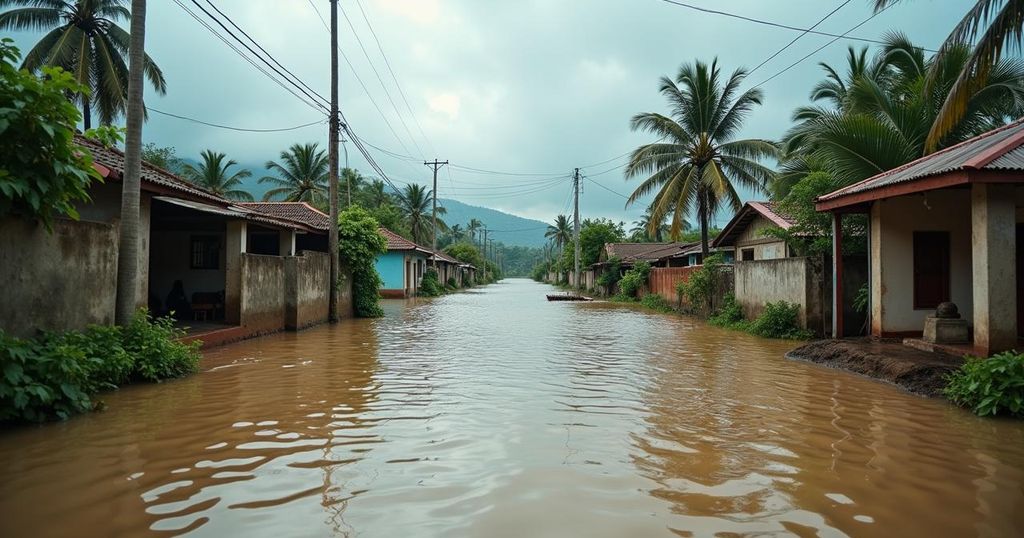The recent floods in West and Central Africa have resulted in over a thousand fatalities and affected over four million people, predominantly in Nigeria. Rising climate disruption has compounded the effects of existing humanitarian challenges, particularly in Maiduguri, where the state suffered from the failure of a crucial dam. Experts stress the need for improved infrastructure and better governance to mitigate the impacts of such disasters in the future. Additionally, the international community must enhance support for recovery efforts in developing nations, where the consequences of climate change are increasingly dire.
The recent catastrophic flooding in West and Central Africa, particularly affecting Nigeria, has resulted in a death toll exceeding a thousand and left over four million people in dire straits. The floods wreaked havoc across several countries, including Mali, Senegal, and Chad, marking a stark illustration of the escalating climate crisis. During an interview with Steve Curwood, Nana Mohammed, a graduate student and intern, detailed the overwhelming impact of these floods, particularly in Maiduguri, Nigeria, where the state governor reported that approximately 2 million individuals have been severely impacted. This disaster substantially parallels past humanitarian crises in the region, such as the Boko Haram attacks, with reports of unaccompanied and missing children now surpassing those documented during the violence. The extent of the calamity was compounded by the failure of the Alau Dam, which had been neglected despite prior warnings regarding its vulnerability. Notably, the floods resulted from unprecedented rainfall patterns—far exceeding forecasts and previous experiences in the area. Experts attribute such extreme weather events to climate disruption, although public perception in Nigeria regarding climate change remains confused, with some still perceiving it as an act of divine will rather than a scientific issue. Moreover, systemic corruption and inadequate infrastructure exacerbate the consequences of such disasters, as funds intended for mitigation are often misallocated. Dr. Vincent Nduka Ojeh emphasized that Nigeria’s further vulnerability stems from poor urban designs and a lack of resources to effectively address these challenges. He, alongside Abdulrahim Isma’il, a journalist based in Maiduguri, identified the urgent need for an adaptation strategy to cope with future climate events, advocating improvements to drainage systems and infrastructure resilience. The international community’s response appears disproportionate in comparison to the immediate needs faced by developing countries like Nigeria, which require substantial financial support for recovery efforts. The projected cost of climate-related damages for developing nations is anticipated to reach $400 billion by 2030. Thus, both developed and developing nations must collaboratively promote effective resource utilization and comprehensive adaptation plans to mitigate the impacts of ongoing climate disruption.
Throughout the past several weeks, West and Central Africa have endured devastating flooding, prompting grave humanitarian crises, particularly in regions like Nigeria, Mali, Senegal, and Chad. This incident underscores a broader narrative concerning climate change, demonstrating all too vividly how its repercussions extend globally. In regions such as Poland and other parts of Central Europe, while severe flooding has caused significant destruction, the human toll pales in comparison to the death and despair occurring in Africa. Here, the environment, socio-economic factors, and inadequate infrastructure make the population more susceptible to climate adversities. As nations across the globe grapple with the aftermath of climate change, the situation in Nigeria highlights the urgent need for comprehensive strategies to enhance resilience and recovery.
In conclusion, the recent flooding in West Africa, with its catastrophic effects primarily felt in Nigeria, serves as a dire reminder of the vulnerabilities faced by regions most susceptible to climate-induced disasters. There is an essential need for improved infrastructure, responsive governance, and international cooperation to address the critical challenges posed by climate change. Furthermore, enhancing public understanding of climate issues remains paramount. The collective efforts of both developing and developed nations are required to secure substantial financial resources for recovery and adaptation plans, underlining the complexity and urgency of the climate crisis.
Original Source: insideclimatenews.org






